Memoirs & Diaries - The Invasion of Romania
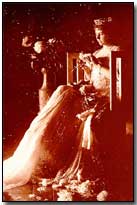 Below is the memoir - written while the
war was underway - penned by Queen Marie of Romania, of the German-led
invasion of her country. Queen Marie was a British princess who
married the German-Romanian Prince Ferdinand, later King Ferdinand I.
Below is the memoir - written while the
war was underway - penned by Queen Marie of Romania, of the German-led
invasion of her country. Queen Marie was a British princess who
married the German-Romanian Prince Ferdinand, later King Ferdinand I.
Distances are so great and communication so difficult, that very few details of our troubles and trials reach other countries.
We are completely isolated from all our Allies, except Russia, and have had to stand unheard-of hardships because relief could only be offered us from one side, and that side needed all its resources for itself.
The winter that lies behind us is as one of the most fearful nightmares man ever dreamed. There is no suffering that my people have not been called upon to endure, no fear, no sorrow, no pain - every misery, both moral and physical, had to be borne at once.
And I, their Queen, suffered with them, struggled with them, wept with them, shared and understood their every grief.
I too had to leave a home I loved, I too had to flee before the invading foe, had to forsake the new-made grave of the little one who was torn from me whilst the enemy was flooding my land on every side.
All have I known of mortal anguish, of days when hope became less and less, till the last shred had to be surrendered - my child and my country both at once.
The remembrance I keep of those days is of a suffering so great that it almost blinded me; I was as one wandering in fearful darkness wondering how much anguish one single heart can hear; black waves seemed to be rushing in upon me threatening to drown me, yet I was quite calm and continued living and working as though my heart had not been torn from my breast.
Strong ties of sympathy had always bound me to my people, but since the extraordinary misfortunes we have undergone together, our mutual affection has turned into deep and comprehensive love.
The grief that God sent me whilst so many were mourning rendered me strangely dear to their hearts; I had suddenly come quite close to them - they felt in me a comprehension of their own woes that had not been mine before.
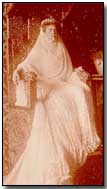 An immense tide of sympathy
flowed from their souls to mine, giving me strength to bear bravely every
sacrifice, and not to give way to selfish despair. Tragedy had come
upon us, recrimination would but weaken us, complaint lessen our courage -
nothing was left to us but dumbly to bear our Fate.
An immense tide of sympathy
flowed from their souls to mine, giving me strength to bear bravely every
sacrifice, and not to give way to selfish despair. Tragedy had come
upon us, recrimination would but weaken us, complaint lessen our courage -
nothing was left to us but dumbly to bear our Fate.
Winter came and with it retreat; hunger came and sickness and death in every form.
One town after another had to be surrendered, ever smaller became our country, a cruel exodus encumbered the remaining provinces; our riches, our pride, our hopes had been torn from us, and like a troop of emigrants we had to try and find place for our weary bodies and for our sorrowful hearts.
Each thing we thought we could count upon crumbled before the inflow of an enemy ten times too strong for us, who knew all about war whilst we were ignorant and had everything to learn.
Nowhere were we safe; all the help that had been promised us was not forthcoming, we had nowhere to turn to in our agony, and the deadliest of winters was closing in upon us before we knew if we could remain there where we had pitched our tents!
Amidst this constant fear of further invasion we had to gather our courage and our wits so as to improvise hospitals, house refugees, feed and clothe our retreating troops, all this with the feeling that next day perhaps our efforts would be in vain, that the work so painfully accomplished would fall into the enemy's hand!
All our stores, our hoarded treasures, our food, corn and oil had been torn from us by the rapid advance of the foe; all that remained to us of our once blooming country were but a few provinces, the poorest, those upon which in the days of abundance we had counted least.
That was but the material side of our distress, and to that must be added every anguish, every grief of departure and separation, the leaving of loved homes, the haunting pictures of devastation, fire and ruin, of abandoned graves and of dying heroes who could not be saved.
With a fresh wound in my own heart I stood amidst the turmoil. I myself empty-handed - I myself a refugee! What had been mine lay behind the line of fire - also the lonely little grave lay there, belonged now to the enemy, and with it all the torturing remembrance of my child's illness and death. He was my youngest, my baby, and just the most helpless had I to forsake!
But there was no time to cry over a personal grief, in the hour of disaster so much depends upon the leaders not losing their heads.
To piece together that which is broken is no easy task; if your house falls down around you, at first your only wish is to sit on its ruins and weep. It is then that those whose love and courage are greatest must come forward and help. Those too grievously smitten cannot immediately lift up their heads, and very gentle must be the hand that endeavours to lead them back from darkness to light.
For a while I thought that the effort would be beyond my strength, such was the hopeless discouragement that had taken possession of every heart. No good news came to gladden our spirits, only tidings of defeat, disaster and distress, and winter lay over everything like a pall of despair.
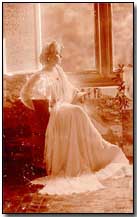 Then little by little hands
were stretched out to help. French and English doctors offered their
assistance and with them many nurses and sisters whose devotion has no name.
Then little by little hands
were stretched out to help. French and English doctors offered their
assistance and with them many nurses and sisters whose devotion has no name.
Little by little we began building up what had fallen; at first only those whom adversity cannot crush showed the way, then others joined to - until imperceptibly a great new effort was born, and with that effort, new courage and new hope.
It were too long to relate all the weary work of this past winter, a whole volume of want and suffering, of devotion and charity would not suffice. So many single incidents rise before me, so many faces, so many efforts, and alas! so many death-beds that I hesitate which to describe.
There is too much to tell, too many pictures haunt me, pictures of what was, what is, and of what we hope one day will be.
I look back and see visions of my country as for twenty-three years I have known it, peaceful, blooming, full of abundance, its vast plain an ocean of waving corn amongst which diligent peasants move to and fro gathering in the harvest, the land's dearest pride.
I see its humble villages hidden amongst fruit trees, I see the autumn splendour of its forests, I see the grand solitude of its mountain summits, I see its noble convents, corners of hidden beauty, treasures of ancient art, I hear the sound of the shepherd's horn, the sweet complaint of his ditties.
I see long roads with clouds of dust rising from them, many carts in a file, I see gaily clad peasants flocking to market. I see naked plains and long stretches of sand by the sea.
I also see our broad, proud Danube rolling its many waters past quaint little villages and boroughs inhabited by motley crowds of different nationalities, past towns of which the rising industries are a promise of future wealth. I see our port of Constanza with its bustle, its noise and its hopes.
Then on August 27, 1916, the call to arms - War!
I see the ardent faces of my young soldiers going off gaily to battle - I see the trains leaving, the flowers that decorate the cannons, horses and men-I hear the tramping of passing regiments, shouts of enthusiasm, words of exultation.
I see the first wounded in the hospitals of Bucharest, white beds, many faces all turned towards me, eager hands helping; I inspect everything, go everywhere. I have my own hospital in our palace, I too am full of hope.
For a while, a very short while, the news received from our armies is good, awakes wild enthusiasm, awakes dreams of glory in many a breast. Then the first ill tidings, a shadow on the expectant faces - a shadow over the town in spite of the blue sky above!
After that there are still days of hope and confidence, days when the first illusions seem to take form once more, but through it all I have the strange presentiment that my country will have to drink to the dregs the bitterest of cups.
Airships and Zeppelins become a haunting dread by night and by day; our country being narrow, the ground is good for such cruel sport. Death is poured down from the skies into the streets, women and children are slaughtered without number, and as though in defiance of the laws of God, the days they choose for their death-raids are the days when heaven is bluest and the sun shines most brightly.
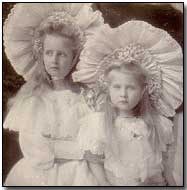 Having been designed by the
enemy as principal culprit, it is the house out of town where I live with my
children that they single out for special punishment, and on a glorious
autumn morning they throw seventy-two bombs upon dwelling and garden where
it is known that my little ones are usually to be found. But on that
day God did not wish another crime to be added to their lists!
Having been designed by the
enemy as principal culprit, it is the house out of town where I live with my
children that they single out for special punishment, and on a glorious
autumn morning they throw seventy-two bombs upon dwelling and garden where
it is known that my little ones are usually to be found. But on that
day God did not wish another crime to be added to their lists!
Ever darker are the clouds gathering around our heads, with anxiety we look for the help that was promised us; Sarrail's advance in the south? The Russians' offensive in Galicia? Russian reinforcements in the Dobrudja? But we wait in vain; no good tidings from any side, and the Germans have not yet straft enough!
Surely this proud little country that had defied her must learn its lesson and be laid low in the dust. And as in the time of the great flood, our small, struggling country is threatened from all sides at once.
Our frontiers are endless, without reinforcements our own resources are too small, we begin to realize the inevitable results if help does not come soon enough.
But my cup is not yet full - amidst all the turmoil and growing anxiety my youngest child sickens and all our efforts cannot save his life. During three mortal weeks we struggle to keep him, but Death rules supreme over the world. It is not to be.
On All Souls' Day, my last born, my little Mircea, passes away - and the voice of the cannon sounds closer every day.
After that, for a while all becomes dark. I grope about as one who has lost her way. Only one thing remains to me, the intense desire to alleviate suffering around me, to go there where despair is greatest, to drown my own grief in the grief of others, to move in places where my own tears can be shed without shame.
So I begin wandering about in all parts of the country that have remained to us. On all sides I hear the dreaded voice of the cannon calling out its message of death and destruction.
I penetrate as far as they will allow me to go, I hunt up those freshly brought in from battle; as in a ghastly dream, I move from bed to bed.
Every form of suffering do I see; the last look of nameless dying do I carry away in my heart, and all the while I have the absolute certainty that my country is becoming smaller and smaller - I am in a hurry, I want to go everywhere - everywhere before it is too late. But in a sort of frenzy of grief I know that all my love, all my devotion cannot hold back the advancing feet of Fate.
Then comes flight! The cruel hour of parting from our capital, of parting from our home, our hospitals, from the little grave so freshly dug - flight!
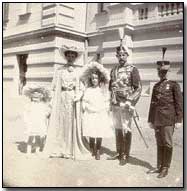 For weeks we live in the
train, not sure how far we must go to be safe; but one only thought moves
me: put the living out of danger, then return once more, only once more to
the grave of the dead!
For weeks we live in the
train, not sure how far we must go to be safe; but one only thought moves
me: put the living out of danger, then return once more, only once more to
the grave of the dead!
But it is not to be - even that consolation is denied me - Bucharest falls, I can no more return to my dead.
My people know that I am absolutely unafraid of contagion, therefore more than ever was I claimed amongst them during this cruel epidemic. I penetrated into the most infected corners, giving everywhere, trying to carry a little hope and help into the most forsaken holes of misery.
I think that few queens have had the privilege to get so near their people. I have really gone amongst them, there where very few go. I have both health and good-will and an inexhaustible desire to console them, to sustain them and to awake hope in their hearts.
Certainly there were days when everything seemed impossible, when the material difficulties were such that the most energetic spirit quailed before the morrow. At those hours it was to me as though I must stand a while quite still, squaring my shoulders, concentrating all my strength so as to lift a weight almost beyond what a single man can carry.
Thus we struggled on from day to day, from hour to hour. "Faith removeth mountains" - I had Faith!
How often here in Jassy - when going from hospital to hospital, trying to overcome always new difficulties, trying to supply ever new wants, did my thoughts turn to my own hospital in Bucharest, in the large roomy halls of the palace where I had everything I could want - I remember the white beds, the good food, the many helpful hands, eager ladies, books in plenty, music, flowers - a lost paradise indeed!
Here I had no house of my own to turn into a hospital. It was more useful to divide my material and energies, sustaining those already existing. I t is a harder way of doing good, less personal, less satisfactory, needs greater abnegation, brings less comfort to one's soul, but in this case I knew it was best.
My ear had to be open for each cry of distress, my hand always ready to succour or to give, all my energies strained so as to encourage the efforts others were making. I had to go everywhere, see everything myself.
I was almost a stranger to the town of Jassy, thus I gained their confidence, by the way I worked with them. I by degrees stole into their hearts.
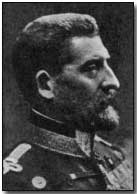 Those who have never seen
them have no notion of what Rumanian roads can become in winter, of how
difficult is all circulation, how communication becomes an effort almost
beyond human strength - and this winter was a winter of terrible snow and
frost.
Those who have never seen
them have no notion of what Rumanian roads can become in winter, of how
difficult is all circulation, how communication becomes an effort almost
beyond human strength - and this winter was a winter of terrible snow and
frost.
Part of our army had to be quartered in small, miserable villages, cut off from everything, buried in snow, transports were almost impossible, untold of hardships had to be borne.
All my energy and good-will could not take me to places where neither motor, sledge, nor carriage could go - I knew that there was want and sickness in those villages, but it was only towards springtime that I could reach them with infinite difficulty, often having to quit my motor and doing the rest of the road on foot.
That was the hardest work of all, that going about in those fever-stricken hamlets, where the patient troops were herded together in wretched mud-huts alongside of the few remaining peasants.
Food was scarce, hardly any wood for heating, soap was a thing almost not to be found, linen was a luxury of better days - illness in every form broke out amongst the soldiers and many died before we could give sufficient aid!
Ah! Indeed, I have seen death and misery very near. I have moved about amongst them, have felt the despair of my helplessness, have tried with insufficient means to do wonders, but alas! against sickness, cold and hunger goodwill alone did not suffice - not to be numbered were the graves that overfilled the cemeteries; like a wood, the rough crosses grew up side by side.
And yet how much more ghastly is the fate of those in the invaded part of the country, where no help can penetrate.
Here I can at least get to my people - visit them or send them food, aid, comforts - but there in the dear regions we have lost, what may their sufferings be? Who succours them? Who consoles them? Who helps them to hope?
The enemy must have taken everything from them, forcing them to work against their own brothers, and probably he scoffs at their misery, trying to make them doubt the love of those who had to leave them to so cruel a fate!
That thought is the hardest of all! And to be so helpless - to have no news, no details, to be entirely cut off! I feel it is a rambling tale, the tale I have told - it is as though I had written in a trance - maybe I have often repeated myself, yet I have only said half of what I had to say.
One day perhaps when this period of suffering will be a little more distant I will more clearly be able to write the history of these days of distress.
Source: Source Records of the Great War, Vol. V, ed. Charles F. Horne, National Alumni 1923
"Bellied" was a term used to describe when a tank's underside was caught upon an obstacle such that its tracks were unable to grip the earth.
- Did you know?
